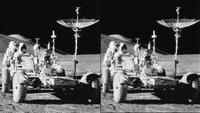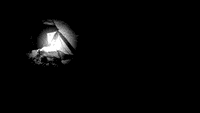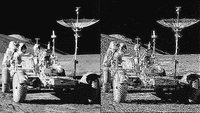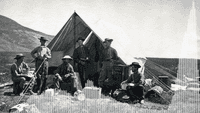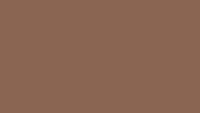Examples+
Convolution
by Daniel Shiffman
Applies a convolution matrix to a portion of an image. Move mouse to apply filter to different parts of the image.
Highlighted Features
/**
* Convolution
* by Daniel Shiffman.
*
* Applies a convolution matrix to a portion of an image. Move mouse to
* apply filter to different parts of the image. Click mouse to cycle
* through different effects (kernels).
*/
PImage img;
int effect = 0;
int w = 120;
// It's possible to convolve the image with many different
// matrices to produce different effects. Here are some
// example kernels to try.
float[][] identity = { { 0, 0, 0 },
{ 0, 1, 0 },
{ 0, 0, 0 } };
float[][] darken = { { 0, 0, 0 },
{ 0, 0.5, 0 },
{ 0, 0, 0 } };
float[][] lighten = { { 0, 0, 0 },
{ 0, 2, 0 },
{ 0, 0, 0 } };
float[][] sharpen = { { 0, -1, 0 },
{ -1, 5, -1 },
{ 0, -1, 0 } };
float[][] sharpen2 = { { -1, -1, -1 },
{ -1, 9, -1 },
{ -1, -1, -1 } };
float[][] box_blur = { { 1.0/9.0, 1.0/9.0, 1.0/9.0 },
{ 1.0/9.0, 1.0/9.0, 1.0/9.0 },
{ 1.0/9.0, 1.0/9.0, 1.0/9.0 } };
float[][] edge_det = { { 0, 1, 0 },
{ 1, -4, 1 },
{ 0, 1, 0 } };
float[][] emboss = { { -2, -1, 0 },
{ -1, 1, 1 },
{ 0, 1, 2 } };
// collect the kernels and names into arrays for our program
float[][][] kernels = {
identity,
darken,
lighten,
sharpen,
sharpen2,
box_blur,
edge_det,
emboss
};
String[] effect_names = {
"Identity (no change)",
"Darken",
"Lighten",
"Sharpen",
"Sharpen More",
"Box Blur",
"Edge Detect",
"Emboss"
};
//
void setup() {
size(640, 360);
img = loadImage("moon-wide.jpg");
noLoop();
}
// Clicking the mouse advances to the next effect
void mousePressed() {
effect++;
if (effect >= effect_names.length) effect = 0;
redraw();
}
// Moving the mouse triggers a screen redraw
void mouseMoved() {
redraw();
}
void mouseDragged() {
redraw();
}
void draw() {
// We're only going to process a portion of the image
// so let's set the whole image as the background first
image(img, 0, 0);
// Calculate the small rectangle we will process
int xstart = constrain(mouseX - w/2, 0, img.width);
int ystart = constrain(mouseY - w/2, 0, img.height);
int xend = constrain(mouseX + w/2, 0, img.width);
int yend = constrain(mouseY + w/2, 0, img.height);
int matrixsize = 3;
loadPixels();
// Begin our loop for every pixel in the smaller image
for (int x = xstart; x < xend; x++) {
for (int y = ystart; y < yend; y++ ) {
color c = convolution(x, y, kernels[effect], matrixsize, img);
int loc = x + y*img.width;
pixels[loc] = c;
}
}
updatePixels();
textSize(24);
text(effect_names[effect], 4, 24);
}
color convolution(int x, int y, float[][] matrix, int matrixsize, PImage img)
{
float rtotal = 0.0;
float gtotal = 0.0;
float btotal = 0.0;
int offset = matrixsize / 2;
for (int i = 0; i < matrixsize; i++){
for (int j= 0; j < matrixsize; j++){
// What pixel are we testing
int xloc = x+i-offset;
int yloc = y+j-offset;
int loc = xloc + img.width*yloc;
// Make sure we haven't walked off our image, we could do better here
loc = constrain(loc,0,img.pixels.length-1);
// Calculate the convolution
rtotal += (red(img.pixels[loc]) * matrix[i][j]);
gtotal += (green(img.pixels[loc]) * matrix[i][j]);
btotal += (blue(img.pixels[loc]) * matrix[i][j]);
}
}
// Make sure RGB is within range
rtotal = constrain(rtotal, 0, 255);
gtotal = constrain(gtotal, 0, 255);
btotal = constrain(btotal, 0, 255);
// Return the resulting color
return color(rtotal, gtotal, btotal);
}
Related Examples
This example is for Processing 4+. If you have a previous version, use the examples included with your software. If you see any errors or have suggestions, please let us know.
